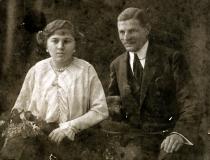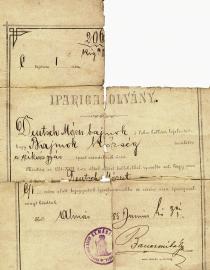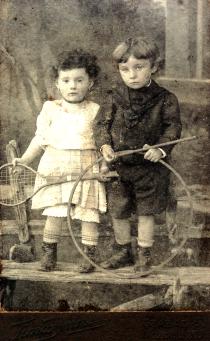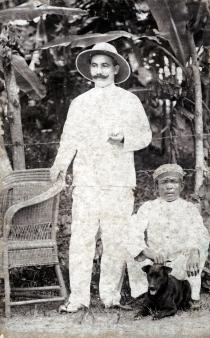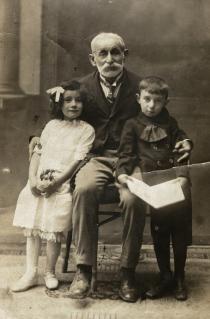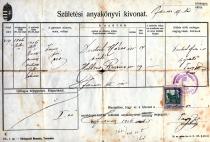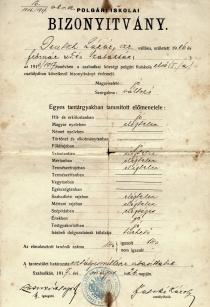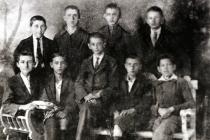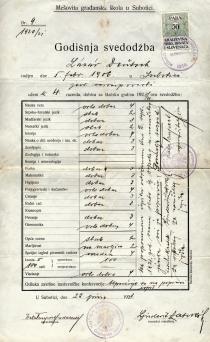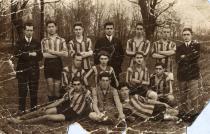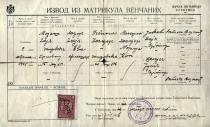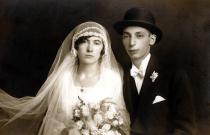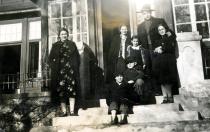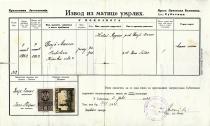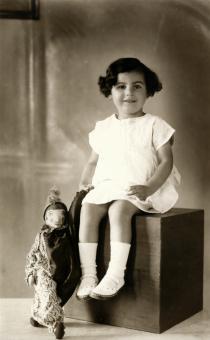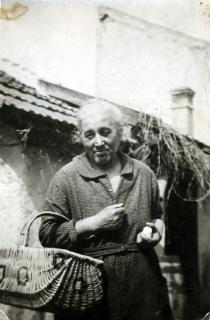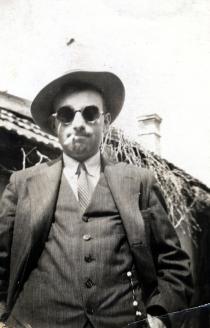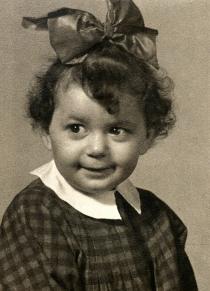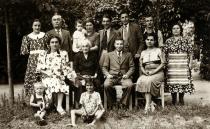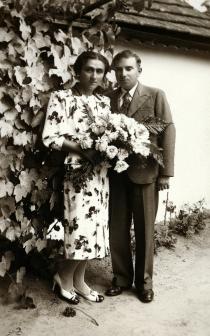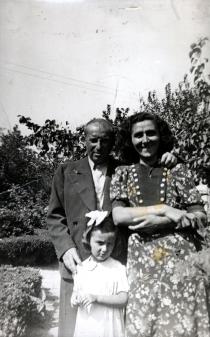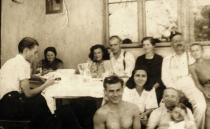
Marika Krpez
Subotica
Serbia
Interviewer: Klara Azulaj
I am Marika Krpez (nee Deutsch) and I was born in Subotica on September 5,
1938. My father, Lazar Deutsch, was born in Subotica on February 5, 1906,
and died in Mauthausen, either on April 16 or May 9, 1945. My mother Jelena
(nee Vasic) Deutsch was born in Martonos, on June 10, 1912, and died in
Subotica on September 30, 1985.
Family background
Growing up
During the War
After the War
My paternal grandmother, Regina Deutsch (nee Holtzer) was the real pillar
of our family. She was born in Szeged on April 20, 1876. I think that she
was very poor, because she married when she was 29 years old. In those days
that was very late. She married a widower, Mor Deutsch, who was 25 years
older than her and who had a daughter, Serena, from his first marriage. I
know that she married in 1930 and went to live in Budapest. We went to stay
with her and her family when Subotica became a part of Hungary (editor's
note: after the German invasion of Yugoslavia in March 1941, northern
Serbia was awarded to Germany's ally, Hungary) . She had two daughters,
Eva and Maria, and a son, Lajos, who was called Lalika, and whom I adored.
He always made me laugh and he loved to entertain me. Unfortunately he did
not return from forced labor when they cleaned up the debris. I saw my Aunt
Serena and her daughters for the last time in November 1943.
My paternal grandfather, Mor Deutsch (in some documents his name appears as
Mozes Moric or Mavar), was born on May 16, 1851. Grandfather Mor worked as
a producer of soda water. He died in Subotica on March 8, 1923.
During her marriage to my grandfather, Regina had two children, my father
Lazar, and a daughter, Klara. They lived in an apartment that had an
entrance into the garden. Grandmother Regina was a housewife. They had a
very difficult life. My grandmother kept a kosher kitchen and in her
kitchen one could always smell garlic. Every afternoon my father, mother
and I would go to visit her. Grandmother Regina was very religious. She
insisted that all the holidays be celebrated in her house, and she went to
great efforts to make sure that everything was according to the laws. I was
two years old and cannot recall all the details about celebrating our
holidays. All the members of the family regularly went to synagogue. My
grandmother liked to knit and to do all other kinds of handicrafts. She
died in Subotica in 1940. Both my grandfather and grandmother were buried
in the Jewish cemetery. My father did not have much money and so he erected
a metal plaque with the basic data for them.
My father's sister, Klara Bohm (nee Deutsch), was born on April 30, 1907 in
Subotica. She was a milliner. She married a man who did not work steadily,
so she was always up to her ears in work to ensure her family's survival.
She worked all day in the workshop where she made women's hats. The shop
was in the Jewish area of the market. My aunt Klara had two daughters: Eva,
born in 1930, and Ana, born in 1934. All three of them were taken to
Auschwitz in 1944 and immediately killed.
My father, Lazar Deutsch, nicknamed Lazi, went to a Jewish elementary
school. He started school during the Austro-Hungarian Empire, and all the
lessons were in Hungarian. In 1918 when Yugoslavia was created, he had to
change to a Serbian school, because, according to the law, Jews had to go
to Serbian schools. He had never learned Serbian and that is why he was a
bad student. But he had nice handwriting.
He went to work in a big wholesale store as an apprentice. He worked there
until 1937 when he married. My mother, Jelena, sold a small parcel of land
that she and her sister had received from the state, and my father used
this money to start his own business. He sold buttons, threads and other
items to tailors in neighboring villages. My mother used to tell me about
how he was such a good man and how he used to give people the goods on
credit. When he came to collect the money, the debtors would prepare a
chicken soup and ask him to be patient, and they would certainly pay him
back the next time he came to collect. Because of this laxity, he was
always on the verge of bankruptcy.
Our family was very poor, so we never had our own home, we always lived in
rented apartments. When I was born, we lived in a garden apartment not far
from the center, in a quiet neighborhood called Kert. All the houses there
were family homes with gardens. When I was a year and a half old we moved
to a two-room apartment in a large house with a garden. Then I got a cat
named Marko.
Even though I was very young at the time, I remember my father as very
caring and tender. When I was two years old I came down with whooping
cough. During this illness he was with me all the time, he even held my
head when the coughing made me throw up. He took me to Plinar because they
said that the air there helped reduce coughing. He was always laughing and
frequently carried me on his shoulders. His friends told me that he was the
favorite in their group. He was a good football player and a member of the
Hakoah football club.
My mother, Jelena Deutsch, was not a Jew. She was born in the village of
Martones, 30 kilometers from Subotica. Her father died in World War One and
her mother, Olga Vasic (nee Ziskov), died in 1919 from Spanish fever. My
mother and her sister, Olga, were raised by their grandfather. At age 14 my
mother came to work in Subotica. There she met my father. They dated for
five years but my grandmother opposed this relationship because Jelena was
not a Jew. When my father took ill, my mother took care of him, and only
then did my grandmother relent and agree that her son could marry a shiksa
(non-Jewish woman), as she called her. My mother made a great effort to
learn as much as possible about Judaism. From her mother-in-law she even
learned to cook Jewish food. Quickly, she acquired significant knowledge
about Judaism, and she raised me and educated me in this spirit. She was a
devoted wife and mother. She died in Subotica on September 30, 1985.
When war broke out in 1941, my father was in the reserves and he managed to
make it to Subotica on foot where the Hungarian troops had already entered
on April 10, 1941. Shortly after that all Jewish males began to be taken
away for forced labor, at first near Subotica to build and fix roads and
train tracks. In 1941, after about two or three months, my father was sent
home for a short leave. At the beginning of 1942 he and all other males
over 18 were taken for forced labor. He went from camp to camp, changing
work camps 15 times. Most of these camps were in present-day Hungary.
Between 1941 and 1943, my father was in a work camp in Transylvania (today
in Romania) and that is where I saw him again. Until the arrival of the
Germans, the Hungarians allowed visits to the camps, and my mother and I
went to see him. In the autumn of 1943, my father had learned that he was
going to be sent someplace far away, and he asked my mother to bring me to
visit him. At that time most men were being sent to Ukraine to clean up the
ruins and to dig trenches. But they did not send him there.
On the 9th of November 1943, my mother and I started out on the visit to
the work camp in Miskolc. We traveled by train. There was an open section
in the wagon where there was a police officer with a feather in his hat-
these officers were well-known for their brutality. The train stood still
and my mother started to get off, not knowing that we had yet to arrive at
the station. At that moment, we suppose the officer pushed her, because she
lost her balance and, together with me, fell onto the tracks. The train
started moving and my left fist was on the track and was run over by the
train. I screamed and a railroad employee ran up to us and helped us get to
the station. Here they gave me first aid. An express train was stopped
which took us to Miskolc. They operated on me immediately. I also had a
concussion. My father found out what had happened to me from the Hungarian
commandant of the camp, and he got permission to come visit me in the
hospital. The last time we saw each other was November 19, 1943, when he
accompanied my mother and me to the station. We traveled to Budapest, where
we stayed with my father's sister, Serena, and from there we continued on
to Subotica. In Subotica, I went frequently to have my hand treated at the
Jewish hospital, which at that time had been forcibly relocated to the
basement of the building.
At the end of 1944, my father Lazar was sent to Mauthausen. He arrived
there on foot and met up with his sister Klara's husband and others from
Subotica, who relayed to us that he died there of typhoid.
Germans occupied Hungary on March 19, 1944, and formed ghettos in three
places in Subotica. A neighbor rescued my mother and me from the ghetto.
She met us on the street and told us not go home under any conditions
because another neighbor had already given our names to the authorities.
From then until the end of the war we were hidden by two Hungarian
families.
The first was the Domsodi family. They were three sisters who lived in a
family house with a big garden in the suburb of Subotica. They were
seamstresses and I recall that they gave me rags and cloth rests to play
with. They were very kind to me, very gentle and understanding. At the same
time, my mother was hiding at the Borosh family's house. It was safer, both
for us and those families, that my mother and I were separated and that we
also changed our hiding places from time to time. In the Borosh family were
three children whom I played with. In their yard was a shelter where we hid
during bombings. In the shelter were only a few things, a bed and an oil
lamp. I stayed with them until the war was over.
The first Yom Kippur after the war, my mother and I went to synagogue.
Instead of sitting upstairs we sat downstairs. When I opened the drawer
where the prayer books were, I discovered that I was in what had been my
father's place, because there was a small plaque on the seat with his name
on it.
I finished primary school and gymnasium in Subotica. From 1957 to 1961 I
studied English in Belgrade where I met my future husband, Djordje Krpez,
from Zsombor. We married in 1962. We returned to Subotica and on August 11,
1962 I had a daughter, Branka. I worked as a professor until my retirement
in and 1993.
I am very active in the Jewish Council. I was a member of the executive
board for about 20 years. I have been a member of the executive board of
the Jewish Councils' Union since 1996. At the moment I am the second vice
president of the Jewish Council in Subotica. I take part in all activities
and I am trying to give the others as much as I can of my knowledge and
experience.
